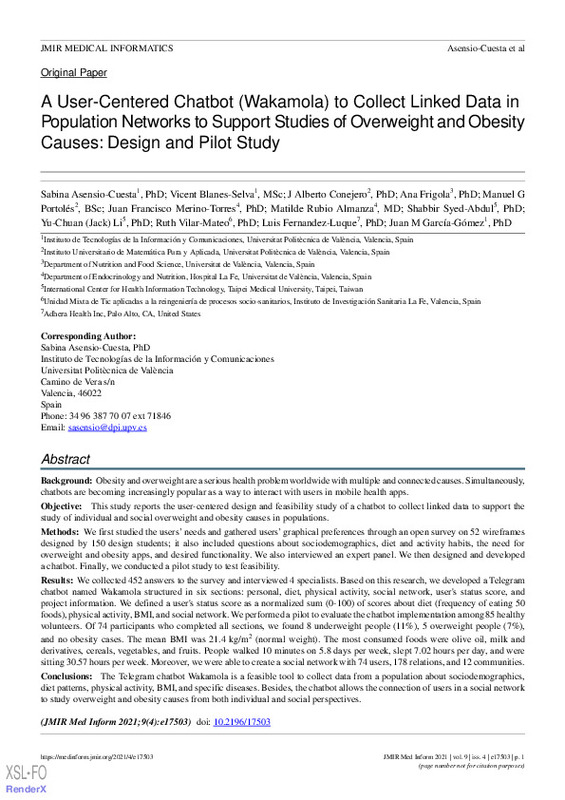JavaScript is disabled for your browser. Some features of this site may not work without it.
Buscar en RiuNet
Listar
Mi cuenta
Estadísticas
Ayuda RiuNet
Admin. UPV
A User-Centered Chatbot (Wakamola) to Collect Linked Data in Population Networks to Support Studies of Overweight and Obesity Causes: Design and Pilot Study
Mostrar el registro sencillo del ítem
Ficheros en el ítem
| dc.contributor.author | Asensio-Cuesta, Sabina
|
es_ES |
| dc.contributor.author | Blanes-Selva, Vicent
|
es_ES |
| dc.contributor.author | Conejero, J. Alberto
|
es_ES |
| dc.contributor.author | Frigola, Ana
|
es_ES |
| dc.contributor.author | Portolés, Manuel G.
|
es_ES |
| dc.contributor.author | Merino-Torres, Juan Francisco
|
es_ES |
| dc.contributor.author | Rubio Almanza, Matilde
|
es_ES |
| dc.contributor.author | Syed-Abdul, Shabbir
|
es_ES |
| dc.contributor.author | Li, Yu-Chuan (Jack)
|
es_ES |
| dc.contributor.author | Vilar-Mateo, Ruth
|
es_ES |
| dc.contributor.author | Fernández-Luque, Luis
|
es_ES |
| dc.contributor.author | Garcia-Gomez, Juan M
|
es_ES |
| dc.date.accessioned | 2022-10-13T18:07:27Z | |
| dc.date.available | 2022-10-13T18:07:27Z | |
| dc.date.issued | 2021-04 | es_ES |
| dc.identifier.uri | http://hdl.handle.net/10251/187694 | |
| dc.description.abstract | [EN] Background: Obesity and overweight are a serious health problem worldwide with multiple and connected causes. Simultaneously, chatbots are becoming increasingly popular as a way to interact with users in mobile health apps. Objective: This study reports the user-centered design and feasibility study of a chatbot to collect linked data to support the study of individual and social overweight and obesity causes in populations. Methods: We first studied the users' needs and gathered users' graphical preferences through an open survey on 52 wireframes designed by 150 design students; it also included questions about sociodemographics, diet and activity habits, the need for overweight and obesity apps, and desired functionality. We also interviewed an expert panel. We then designed and developed a chatbot. Finally, we conducted a pilot study to test feasibility. Results: We collected 452 answers to the survey and interviewed 4 specialists. Based on this research, we developed a Telegram chatbot named Wakamola structured in six sections: personal, diet, physical activity, social network, user's status score, and project information. We defined a user's status score as a normalized sum (0-100) of scores about diet (frequency of eating 50 foods), physical activity, BMI, and social network. We performed a pilot to evaluate the chatbot implementation among 85 healthy volunteers. Of 74 participants who completed all sections, we found 8 underweight people (11%), 5 overweight people (7%), and no obesity cases. The mean BMI was 21.4 kg/m(2) (normal weight). The most consumed foods were olive oil, milk and derivatives, cereals, vegetables, and fruits. People walked 10 minutes on 5.8 days per week, slept 7.02 hours per day, and were sitting 30.57 hours per week. Moreover, we were able to create a social network with 74 users, 178 relations, and 12 communities. Conclusions: The Telegram chatbot Wakamola is a feasible tool to collect data from a population about sociodemographics, diet patterns, physical activity, BMI, and specific diseases. Besides, the chatbot allows the connection of users in a social network to study overweight and obesity causes from both individual and social perspectives. | es_ES |
| dc.description.sponsorship | Moreover, the authors acknowledge the funding support for this study provided by the CrowdHealth Project (Collective Wisdom Driving Public Health Policies, 727560). | es_ES |
| dc.language | Inglés | es_ES |
| dc.publisher | JMIR Publications Inc. | es_ES |
| dc.relation.ispartof | JMIR Medical Informatics | es_ES |
| dc.rights | Reconocimiento (by) | es_ES |
| dc.subject | MHealth | es_ES |
| dc.subject | Obesity | es_ES |
| dc.subject | Overweight | es_ES |
| dc.subject | Chatbot | es_ES |
| dc.subject | Assessment | es_ES |
| dc.subject | Public health | es_ES |
| dc.subject | Telegram | es_ES |
| dc.subject | User-centered design | es_ES |
| dc.subject | Social Network Analysis | es_ES |
| dc.subject.classification | PROYECTOS DE INGENIERIA | es_ES |
| dc.subject.classification | MATEMATICA APLICADA | es_ES |
| dc.subject.classification | FISICA APLICADA | es_ES |
| dc.title | A User-Centered Chatbot (Wakamola) to Collect Linked Data in Population Networks to Support Studies of Overweight and Obesity Causes: Design and Pilot Study | es_ES |
| dc.type | Artículo | es_ES |
| dc.identifier.doi | 10.2196/17503 | es_ES |
| dc.relation.projectID | info:eu-repo/grantAgreement/EC/H2020/727560/EU | es_ES |
| dc.rights.accessRights | Abierto | es_ES |
| dc.contributor.affiliation | Universitat Politècnica de València. Departamento de Matemática Aplicada - Departament de Matemàtica Aplicada | es_ES |
| dc.contributor.affiliation | Universitat Politècnica de València. Departamento de Proyectos de Ingeniería - Departament de Projectes d'Enginyeria | es_ES |
| dc.contributor.affiliation | Universitat Politècnica de València. Departamento de Física Aplicada - Departament de Física Aplicada | es_ES |
| dc.description.bibliographicCitation | Asensio-Cuesta, S.; Blanes-Selva, V.; Conejero, JA.; Frigola, A.; Portolés, MG.; Merino-Torres, JF.; Rubio Almanza, M.... (2021). A User-Centered Chatbot (Wakamola) to Collect Linked Data in Population Networks to Support Studies of Overweight and Obesity Causes: Design and Pilot Study. JMIR Medical Informatics. 9(4):1-14. https://doi.org/10.2196/17503 | es_ES |
| dc.description.accrualMethod | S | es_ES |
| dc.relation.publisherversion | https://doi.org/10.2196/17503 | es_ES |
| dc.description.upvformatpinicio | 1 | es_ES |
| dc.description.upvformatpfin | 14 | es_ES |
| dc.type.version | info:eu-repo/semantics/publishedVersion | es_ES |
| dc.description.volume | 9 | es_ES |
| dc.description.issue | 4 | es_ES |
| dc.identifier.eissn | 2291-9694 | es_ES |
| dc.identifier.pmid | 33851934 | es_ES |
| dc.identifier.pmcid | PMC8087340 | es_ES |
| dc.relation.pasarela | S\433796 | es_ES |
| dc.contributor.funder | COMISION DE LAS COMUNIDADES EUROPEA | es_ES |
| dc.contributor.funder | Universitat Politècnica de València | es_ES |
| dc.subject.ods | 03.- Garantizar una vida saludable y promover el bienestar para todos y todas en todas las edades | es_ES |
| upv.costeAPC | 2460 | es_ES |








